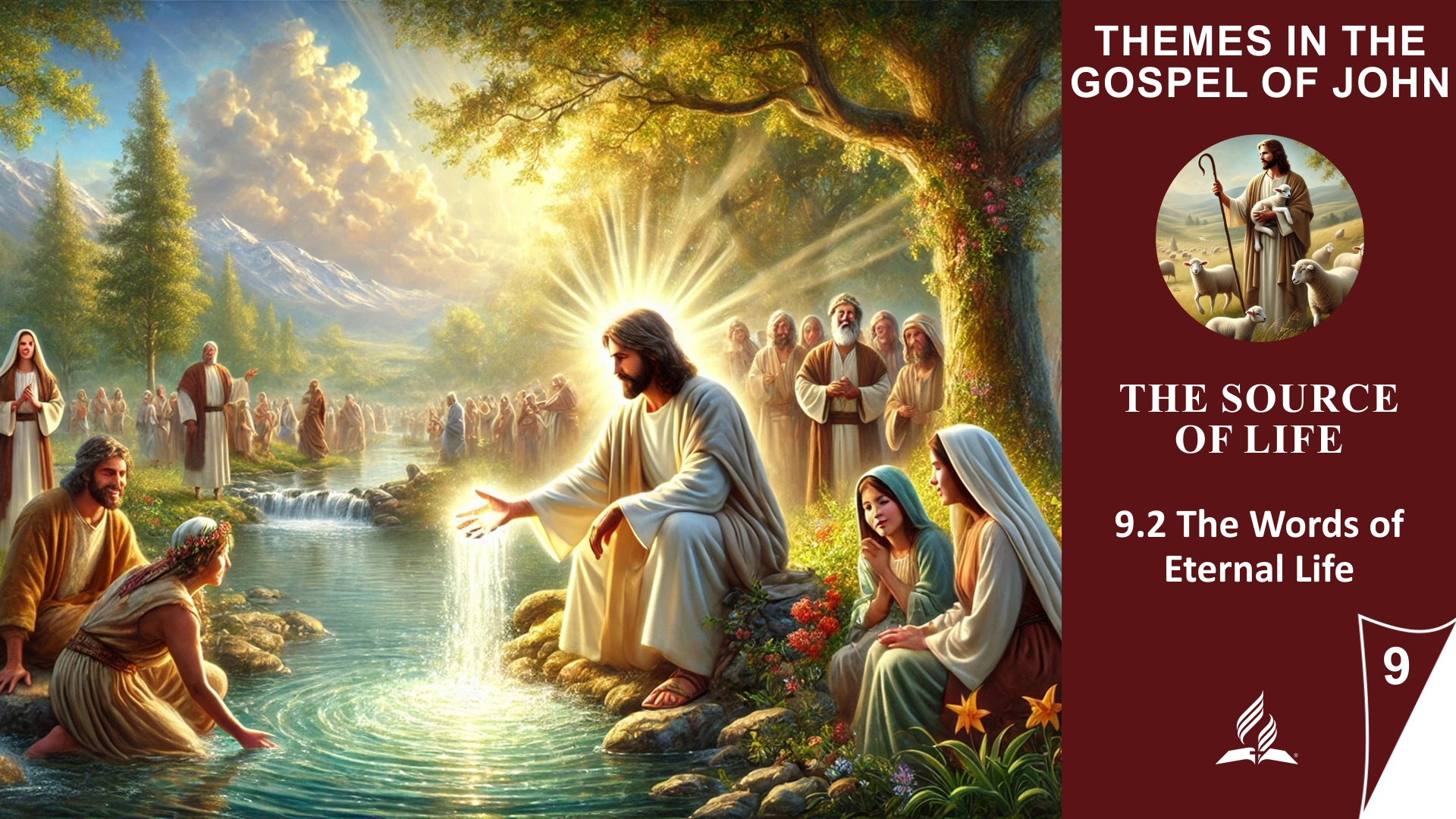


9.2 The Words of Eternal Life
The Words of Eternal Life: A Promise That Changes Everything
Read John 6:61–68. What did Peter’s response mean after Jesus asked his disciples if they wanted to leave him?
Peter’s response to Jesus’ question about whether the disciples wanted to abandon him (John 6:68) is a powerful confession of faith: “Lord, to whom shall we go? You have the words of eternal life.” This statement encompasses several central aspects of faith and Jesus’ message:
-
Jesus’ Exclusive Offer
Peter recognizes that no one else has the words of eternal life except Jesus. Jesus is the only source of life that transcends the earthly. This realization reflects the central theme of the Gospel of John: in Jesus, we find redemption, hope, and the promise of eternal life. The disciples know that they cannot find truth, hope, and fulfillment anywhere else.
Application: Amidst challenges and temptations, we must hold firmly that there is no alternative to Jesus when it comes to true life and redemption.
-
Eternal Life—A Tangible Reality
The term “eternal life” in the Gospel of John describes not only a future life after death but also a life-changing reality in the here and now. It is a life in communion with God that begins through faith in Jesus and is fully realized in the resurrection. Peter testifies that Jesus’ words reveal this truth—words that penetrate deeply and offer new hope.
Application: Jesus’ words provide us with guidance, comfort, and a foundation for our daily lives. They help us find the meaning and purpose of our lives within God’s plan.
-
The Challenge of Faith
Jesus’ words in John 6, especially about “eating his flesh” and “drinking his blood,” were difficult for many listeners to accept. Yet, Peter remains steadfast in his faith despite the challenges. His response shows that faith does not require us to understand everything fully but to trust that Jesus is the way, the truth, and the life (John 14:6).
Application: In our daily faith journey, we often face questions and challenges that we cannot immediately comprehend. Peter’s confession reminds us to hold on to Jesus, even when everything is not clear, because he is the source of life.
-
The Connection to the Bread of Life
Jesus’ statement that he is the Bread of Life (John 6:35) indicates that our spiritual life depends on him just as our physical life depends on bread. By referring to Jesus’ words, Peter acknowledges this life-giving connection: Jesus is the “bread” that satisfies our deepest spiritual hunger.
Application: We should nourish ourselves daily with Jesus’ words by reading the Bible, reflecting on his teachings, and putting them into practice. This spiritual nourishment gives us the strength to face life’s challenges and grow in faith.
Conclusion
Peter’s response in John 6:68 is a profound confession that encapsulates the central message of the Gospel: Jesus alone has the words of eternal life. His message is not only a promise for the future but a living reality that transforms our lives now. The challenge lies in how we hold on to Jesus, even when his words are difficult or unclear. By staying with him, we find life, hope, and the fulfillment of our deepest desires.
How Do We Receive Eternal Life? (John 3:15–16; 5:24; 6:40,47; 8:31; 12:46; 20:31)
Eternal life is granted to us solely through faith, as emphasized in key verses from the Gospel of John (John 3:15–16; 5:24; 6:40,47). It is not something we can earn but a gift offered to us through Jesus Christ. This faith, however, has concrete aspects and leads to an active relationship with Jesus.
-
Faith as the Foundation of Eternal Life (John 3:15–16; 6:47)
In John 3:16, it says: “For God so loved the world that he gave his one and only Son, that whoever believes in him shall not perish but have eternal life.” Faith in Jesus is the key to redemption and eternal life. It is not just about intellectually affirming but deeply trusting that Jesus, through his death and resurrection, has opened the way to life.
Application: We receive eternal life by accepting Jesus as our Lord and Savior and trusting that his sacrifice for our sins is sufficient. This faith is a personal confession and living trust.
-
Hearing and Accepting (John 5:24; 12:46)
Jesus says in John 5:24: “Very truly I tell you, whoever hears my word and believes him who sent me has eternal life and will not be judged but has crossed over from death to life.” Hearing here means not just listening to words but taking them to heart and responding to them. Those who accept Jesus’ words will transition from death to life.
Application: We receive eternal life by opening ourselves to God’s word daily, listening, and aligning our lives accordingly. Faith requires a conscious decision to follow Jesus’ words and place our trust in him.
-
Remaining in the Truth (John 8:31)
In John 8:31, Jesus says: “If you hold to my teaching, you are really my disciples.” Faith in Jesus leads us to live in his truth and be shaped by it. This is not a one-time act but a daily decision to follow Jesus.
Application: Eternal life begins with a first step of faith, but it grows and unfolds as we remain in fellowship with Jesus and faithfully follow him.
-
Repentance and Submission
Faith is not just about intellectually affirming but consciously submitting to Jesus. This means repenting, confessing our sins, and trusting that his blood cleanses us. This dedication opens our hearts to the transformative power of the Holy Spirit, leading us to a new life.
Application: Through repentance and the conscious decision to surrender our lives to Jesus, we receive the gift of eternal life and allow him to transform us.
-
Eternal Life Begins Now (John 20:31)
In John 20:31, John explains that the things he has written are true “so that you may believe that Jesus is the Messiah, the Son of God, and that by believing you may have life in his name.” Eternal life is not just a future hope but a present reality experienced through a relationship with Jesus.
Application: Eternal life begins the moment we invite Jesus into our lives. It gives us peace, joy, and hope that shape our lives in the here and now.
Conclusion: Accepting Eternal Life as a Gift
Eternal life comes solely through faith in Jesus Christ, who has given us the words of life. This faith calls us to respond actively: accept him as Lord and Savior, repent, and remain in his truth. The assurance of eternal life gives us meaning, joy, and hope today and points us toward eternal fellowship with God.
How Does the Promise of Eternal Life Affect How We View Our Earthly Life? How Should It Affect Our Perspective?
The promise of eternal life fundamentally changes how we view and shape our earthly lives. It gives our existence a new perspective that encompasses both the present and the future. Here are some central impacts this promise should have:
-
Meaning and Hope in Difficult Times
-
How It Shapes Us: The assurance of eternal life gives us hope even in the darkest moments. We know that earthly life is not the end and that God has prepared an eternal, glorious life for us. This perspective helps us view suffering, loss, and trials in the light of eternity (2 Corinthians 4:17–18).
-
Our Perspective: Instead of being overwhelmed by life’s challenges, we can remember that they are temporary and fit into God’s eternal plan.
-
Setting Priorities
-
How It Shapes Us: The promise of eternal life shifts our focus from transient things to lasting values. We recognize that material possessions, success, and fame are ultimately fleeting, while our faith, character, and relationship with God endure.
-
Our Perspective: We should invest our time, resources, and energy in what has eternal value—love, mercy, justice, and the advancement of God’s kingdom (Matthew 6:19–21).
-
Freedom from Fear
-
How It Shapes Us: The assurance of eternal life removes our fear of death and uncertainty. Knowing that our lives are in God’s hands allows us to live with confidence and peace.
-
Our Perspective: Instead of living a life full of worries and fears, we can live courageously, confidently, and freely, knowing that God promises us eternal life (John 14:1–3).
-
A Life of Responsibility
-
How It Shapes Us: The promise of eternal life is not only a gift but also a call to consciously and responsibly live our earthly lives. We are God’s stewards—of our time, talents, and resources—and should live in a way that bears witness to Him.
-
Our Perspective: Our decisions, how we treat others, and our commitment to justice and truth should reflect that we are citizens of heaven (Philippians 3:20).
-
Motivation for Evangelism and Service
-
How It Shapes Us: Recognizing the glory of eternal life motivates us to share this hope with others. We want others to experience the promise of eternity with God.
-
Our Perspective: Our mission on earth becomes clearer: we are ambassadors of God, carrying His love and light into the world (2 Corinthians 5:20).
-
A Life Full of Gratitude and Joy
-
How It Shapes Us: The promise of eternal life reminds us of the vastness of God’s love and grace. This fills us with gratitude and joy, even in difficult circumstances.
-
Our Perspective: Instead of focusing on what is lacking, we can rejoice in what God has given us through Jesus Christ—a life in abundance and the hope of eternity (John 10:10).
Conclusion: Living Life in the Light of Eternity
The promise of eternal life should fundamentally transform how we view earthly life. It provides us with hope, priorities, freedom, and responsibility. We recognize that our lives are a gift and a preparation for eternity. This makes our daily lives more meaningful and encourages us to live with gratitude, dedication, and love—knowing that we are created for a greater reality.

Jesus’ words that grant eternal life are not only a promise for the future but have direct implications for our lives today. They shape our daily attitude, our decisions, and our trust in God.
Visited 32 times, 1 visit(s) today






